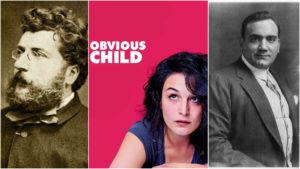
Opera Meets Film: ‘Carmen’ & Caruso As Emotional Dissonance in ‘Obvious Child’
By David Salazar“Opera Meets Film” is a feature dedicated to exploring the way that opera has been employed in cinema. We will select a section or a film in its entirety, highlighting the impact that utilizing the operatic form or sections from an opera can alter our perception of a film that we are viewing. This week’s installment features Gillian Robespierre’s comedy “Obvious Child.”
“Obvious Child’s” use of opera is a strong case of contrast and misdirection.
For some context (and spoilers): Donna Stern is pregnant with the child of Max, a guy she met during a one-night stand. As luck would have it, she keeps bumping into him at random intervals. It’s clear that he’s interested in her and she in him, though she is trying to figure out the best way to tell him that she’s going to abort the child he has no idea she is carrying.
They have been playing a game of cat and mouse for much of the film since that encounter (he does most of the unexpected chasing) and the audience is already anticipating that at some point they might find one another, resolve the issue of the pregnancy and get their relationship moving in a positive direction. This, in spite of the fact that they are shown as being of completely different temperaments and that everyone sees them as incompatible.
But eventually they do get together in a space that is full of visual and (eventually) tonal dissonance.
To this point, Donna has been showcased in gritty bars and old bookstores. She’s not the postergirl for prim and proper and this is further accentuated by how she fits more in her father’s messy apartment than in her mother’s upscale one. Max, meanwhile, is described as a “Christmas Tree” to reflect his seemingly conservative values.
So it is rather interesting that when they do go out to lunch together (and Donna picks the place) it is one that seemingly doesn’t fit into our own perception of Donna. And more to the point – it has opera playing in the background. First, we hear the Act three prelude from “Carmen” before Enrico Caruso’s iconic voice is heard in the background in “O Sole mio.”
It’s a visual shift for the the lead character and intuits her own interest in catering to Max.
The entire setup allows for Robespierre to play a solid hand of misdirection. The opera and vocal selections are in major contrast to everything else that has gone before it. Their very nature, coupled with the warmer color palette in this scene, creates a gentle and tender world around Max and Donna, which gives the audience a hint of romance between them. We’ve been anticipating this “date” between the two for a while at this point in the film and seeing them in a comfortable restaurant playing gentle classical and operatic music only serves to reinforce the sense that the audience will finally get to see their relationship start to develop. And it does, but not the way one expects. The entire scene turns into one awkward moment after another with Donna leaving the table momentarily to think of how she wants to break the news to him about her abortion and then Max derailing that effort with his own strange comment that he dreams of being a grandfather one day.
If anything, the entire scene feels completely unromantic, further distancing them in the eyes of the viewer.
Some might comment that the choice of opera here borders on stereotypical. Romantic scene and setting coupled with opera, etc. And this is perhaps the stereotypical perception that is related in the context of the scene. But unlike other examples where it does become the lifeblood of the emotional pull in a scene, this one works against that perception in service of complete emotional counterpoint. “You think that because there is gentle opera in the background, I am going to suddenly turn this into a romantic scene as other films would? Guess again. I am going to make it completely awkward and the tonal dissonance with the music, is going to add to that,” is the feeling one comes away with instead.


